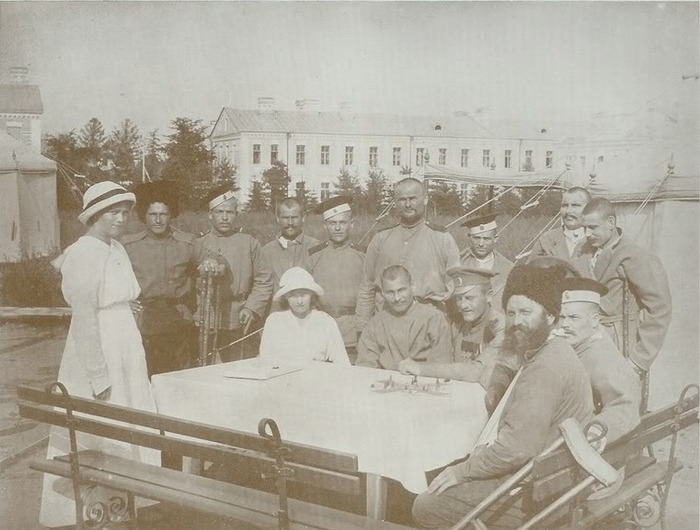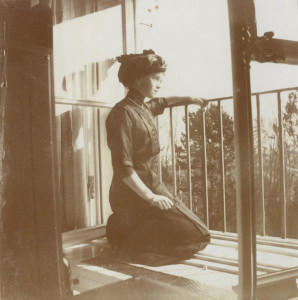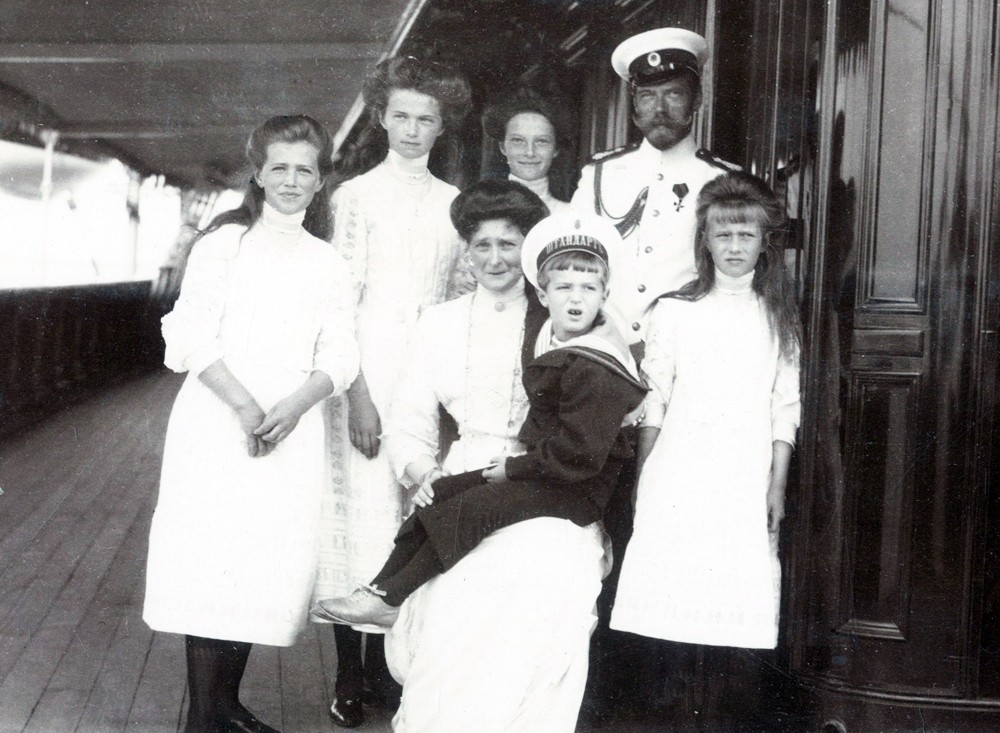
Maria and Anastasia visiting wounded

Olga Nikolaevna, spring 1913
March 17, 2025
On author Laura Rose's Romanov blog, she writes that "Despite so many outwardly bucolic and romantic outings, waltzes on yacht decks, parties and picnics, at its core, the Romanov family was a traumatized one". The claim is interesting, but not at all backed by any evidence.
Let us see the reasons Rose gives: 1) the great sadness shown in some of the photographs, 2) Alexei's hemophilia, 3) Alexandra was "obsessive and hysterical," 4) they were always aware that violence and tragedy could be just around the corner, 5) they witnessed gruesome sights at the hospitals during World War I. She ends by concluding that "Today, they would be in intensive treatment. Then, they were heading-fast toward their ultimate tragedy."
At first, it sounds plausible enough. Is it really outlandish that four young girls who would eventually be murdered and with such a brother and mother didn't have a sense of impending doom? Is it outlandish to say that they had been traumatized? But, and I am certain nearly anyone who has studied OTMA will say so, it is quite outlandish. Let us examine the first claim, that they show great melancholy in their photographs. Laura Rose provides two examples:

Maria and Anastasia visiting wounded

Olga Nikolaevna, spring 1913
I, personally, see no great sadness in these photographs. In fact, there is a photograph taken of Olga the same day where she appears placid and content. But this phenomenon is not new, and it is not limited to Laura Rose--many times I have seen people commenting on how sad one of the girls looks. They did have reasons to be sad, and to be worried, but overall they led cheerful lives, bolstered by their youth and spirits, and we shall continue attempting to prove that in this blog post.
The second claim is that Alexei's hemophilia instilled in them a constant fear lest he die, and they started to always be watching over him. This is not untrue, but neither is it true. Alexei was generally a happy romping boy, and although he was restricted due to his illness, he was still able to be an ordinary boy most of the time. Moreover, the watching over him was mainly the job of Pierre Gilliard and the sailor nannies. Although OTMA loved and cared for him, they were not the ones checking at every bump and bruise, and due to their young ages, it is doubtful they understood the implications for the dynasty if he died.
The third claim: ALEXANDRA. I write this in capital letters because the very word seems to be infused with an autocratic, stern, and forever sad essence. From what I have read on her blog and in the excerpt Laura Rose provides of her novel, The Passion of Marie Romanov, Rose is no fan of Alexandra, and views her as strict, demanding, and repressive, and now "obsessive and hysterical," obsessed with Rasputin. A bad mother!--a la The Fate of the Romanovs. Everyone has a different interpretation of Alexandra's motherhood, but I do think it can be established that her illness did indeed have a negative effect on her daughters. However, there is hardly any evidence that the daughters were constantly creeping about the palace in fear of their mother, and if anything, they seemed to have loved her dearly--she was capable of fun and silliness despite her popular image, and was not above falling through pillows, pretending to faint, or pulling faces for the camera.
The fourth claim, that the wounds they witnessed while visiting hospitals traumatized them. An interesting argument, and likely true for Olga (although "traumatized" is a strong word), but Tatiana was recorded to be an able and emotionally strong nurse while Maria and Anastasia, although moved by their experiences, were still focused on the lighter side of spending time with the wounded. They came home with plenty to talk about, and loved staying at the hospitals late to play games with the patients. Both of their letters from the war period emanate exuberant gaiety.
In short, there is no evidence that the family was traumatized; like anyone, they witnessed their share of tragedies and had their troubles, but to state that they would need intense treatment is strange. This is not discounting people who have in fact been traumatized; rather, I am saying that the idea of the Romanov sisters being in broken mental states is without any evidence and is firmly placed in the same category as the stories of Rasputin taking advantage of the sisters. (Which would be an interesting blog post. Especially about Xenia Alexandrovna's diary entry, which I've seen, most infuriatingly, quoted as fact!)

Offline Website Builder